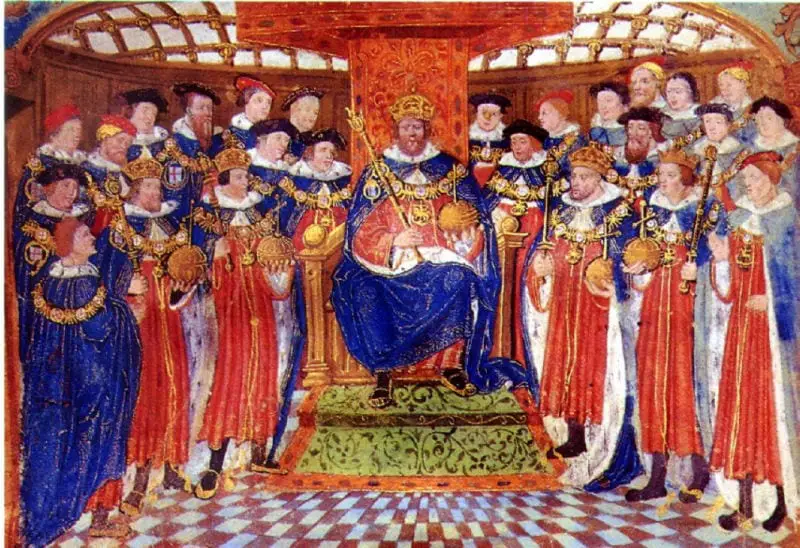Midsummer was a big deal in the pre-modern world.
In Scandinavia, it still is.
I lived in Sweden for three summers and saw the traditions firsthand with the flower wreaths, strawberries, green maypoles, silly dances, smoked fish, and snaps. Nothing is quite as sweet as celebrating the long summer sunshine after months of darkness and cold.
England’s climate is not as extreme as in Scandinavia, but the longest day of the year has been celebrated in England since long before William Shakespeare gave us A Midsummer Night’s Dream. Marking the summer equinox was a well-attested calendar event throughout England’s Middle Ages and beyond.
Katherine of Aragon’s life included two significant events around Midsummer, which multiple historical sources describe in detail.
The first was her joint coronation with Henry VIII on Midsummer’s Day, June 24, 1509, which included a lavish Midsummer’s Eve procession across London. British historian David Starkey compared the ascension of the two young, beautiful rulers to the fairy king and queen, saying the two “seemed indeed to be another Oberon and Titania: their magic spell would knit up old wounds and end ancient hatreds, and all, all would live happily ever after.”
Ironically, Henry VIII and Katherine’s falling out over the lack of a male heir would be far more traumatic than the Shakespearean fairy king and queen’s battle over the Indian child. Henry and Katherine’s schism would reshape their own family, and eventually, the religious landscape of England.
Katherine and Henry’s battle came to a head 20 years after their coronation, just before Midsummer, on June 21, 1529, when Katherine knelt before her husband King Henry VIII and passionately begged him to relinquish his quest for an annulment.
In researching the Thomas Abell story, I have studied historical accounts of both events. While the second one will be more crucial in my story, the first Midsummer event creates the background for understanding who Katherine is and why the English loved her so much.
In 1529, when Katherine knelt before the king, she had the unquestionable support of the public. They loved her. They sided with her; they sympathized with her cause, and they disliked her rival Anne Boleyn, which only further hardened Henry’s heart against Katherine and set the stage for the following tragic years.
In preparing for my story, I imagined Thomas as a young teenager, observing Katherine’s coronation procession with his father in 1509.
Maybe it was something like this ….

Midsummer Eve 1509
Nothing but a gloriously bright future was ahead of England, Thomas thought, as he and his father rounded the cobblestone corner, up Cornhill, towards the banking district where money and power flowed out of the city like the mighty Thames to the South. The entire city of London had turned out into the streets to celebrate. Jostling, shoving, shouting, cheering, singing, toasting each other with pints and cups and barrels of ale, embracing and kissing. It was better than any feast day party. The world was alive with hope. A new age had descended on England. The miserly old king was dead, and so was the great queen, his aged mother. The prince of England and his beautiful young wife would ascend the throne tomorrow morning, Midsummer Day. And this, nearly the longest day of the year, was sunny and bright as Father had said, not a hint of the Londontown rain clouds that hung over the city all winter. Heaven itself could not be this magnificent, Thomas thought, as he carefully sidestepped an open sewage canal. The entire south side of the market district was adorned with gold cloth and Flemish tapestries hanging from windows. Trumpeters and musicians filled the open streets with a cacophony, sometimes merging into melody but mostly just making noise -- happy, joyful, expectant noise, unmatched by the crowd of men, women, and children cheering and clapping. The excitement grew louder, and the crowd parted as a flank of blue-robbed knights emerged in the front of the procession, clearing the streets with their military presence. "The Knights of Bath," Father shouted above the noise. Thomas nodded without taking his eyes off the advancing parade. "New knights, just knighted this week. Men beholden to our new king." Thomas watched the men strutting forward, keepers of the realm, guardians of the new monarchy, men less than a decade older than him, marching into their future. Criers on either side of the street walked alongside, "Long live the king," they shouted until the entire crowd quaked in unison, "Long Live the king. Long live King Henry!" The Constable of London, a man in flowing blue robes waving a silver baton ceremoniously, marched before the king's procession of golden-clad horses. Despite the cheering crowd, the man refused to crack a smile. Instead, his face reflected the gravity of the moment as he made way for the new Prince of Power, the man of the hour, the king's second son now destined to be the most powerful monarch in Christendom. Henry, a young man just a few years older than Thomas, was already blessed with handsome, masculine features. Sitting confidently on his white horse, he made a perfectly princely impression, dressed in a royal crimson velvet robe that, despite the June heat, was luxuriously laced with white ermine fur. Diamonds and precious stones sewn into his jacket twinkled in the sun, generously splashing light on the London houses. Four barons walked solemnly around the prince, holding the gold cloth canopy high above his head as if to protect him from the responsibility that was about to fall on his shoulders. However, The soon-to-be king seemed unaffected by the looming responsibilities and other worldly concerns. Perhaps, like Thomas, he was a young man delighted in the glory of the moment, soaring into the future with all the innocence of youth. His face beamed, bright blue eyes dancing, feet tapping in his stirrups as if anticipating real dancing that awaited him. Henry turned to look behind him as his bride's procession made its way behind him. When their eyes met, he gave her a knowing smile, one that embarrassed Thomas, although he did not know why. The Spanish Princess was the bride of Heaven, the most beautiful woman in the world. Her face beamed with the joy of long-awaited happiness, an uncommon delight Thomas had rarely witnessed in the weary, sullen faces of his hamlet. Hoisted above the crowd on a royal liter drawn by two white prize palfrey, Catherine of Aragon, dressed in pure white, appeared small and delicate. Vulnerable like a rare wildflower. Under her jeweled crown, her auburn hair cascaded to her waist, blowing gently in the afternoon breeze. Thomas had never seen hair like that. Women of his town kept their hair tidily up and under caps, never loose and flowing, except on a rare occasion, in the company of their own homes. When was the last time he had seen his mother's hair let down? When had he ever seen her smile like that at his father? When was the last time he had seen her smile at all? When Catherine's litter passed by Thomas and his father, the young woman seemed to look at all of them directly, searching for familiar faces among the English crowds, "It's like she knows you," Father yelled, jabbing Thomas in the ribs. Thomas smiled broadly. "Oh, she will," he announced. Father's scowl made him wish he had stayed silent. "But likely not," he added, cheeks burning, eyes searching the horizon, away from the princess. "She doesn't know a soul, prince, priest, or peasant in this crowd. Not many Londoners have seen her face since old King Henry kept her locked up these years." "Truly?" Thomas remembered his mother's description of the princess when she had arrived in England. Thomas's mother, a young woman herself, had seen the bright-haired teenager in Spanish robes peering out at the crowds from the protection of her litter and Spanish bodyguards. That had been more than seven years ago, more than half of Thomas's lifetime. Catherine had been a teenager bound to marry the first prince of England, the sickly older brother of the man now poised to be king. That marriage had lasted only a few months before the young man succumbed to the sweating sickness. That same month the Princess Dowager, as she was called, had been cloistered away, hidden from the eyes of the English as her father-in-law haggled with King Ferdinand about the dowry he was so reluctant to send from Spain. It had been a long wait. Thomas watched the train pass by, the ladies in waiting trailing behind Catherine, someone on decorated horseback, some walking, all dressed in royal fashion. When the last one passed, the crowd pressed in to fill in the gap created by the royal train. Barefoot boys climbed the sides of the buildings, arms and legs scrapping against the brownstone, eager to see the parade trailing off into the distance. Someone yanked a gold cloth from an overhead balcony, and then they all came down, tossed into the street, pulled and ripped until the banners were destroyed in shreds, dozens of scraps now greedily caught up by the crowd. Like ancient bread tossed into a hungry Roman crowd, they took a bit of the royalty home for a souvenir, something to hold on to, a tiny bit of glory. Thomas watched the spectacle, unable to move until a toothless old woman in beggar's clothing pressed a ragged palm-sized square of gold cloth into his slim hand. "To remember, young man," she said, nodding to herself as if it was necessary to agree with herself. No sooner had she handed the material to Thomas, a beefy man with leather breaches and an unshaven face suddenly slugged a shorter man standing near them. "That's mine!" The crowd retreated away from the angry drunkard. Two companions of the shorter man charged the beefy one, arms wrestled around his waist, pulling him to the street. Yet another man jumped into the fray, fists, and feet flying. The bits of golden glory fluttered to the ground, trampled into the dirty street as the men struggled. Father grabbed Thomas by the wrist, drawing him away from the rancorous crowd, down a less boisterous street, away from the glitter and the noise, back towards East London and out into the country beyond. Heaven had been short-lived.



Enjoyed my first glimpse immensely!